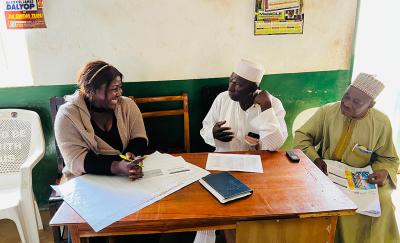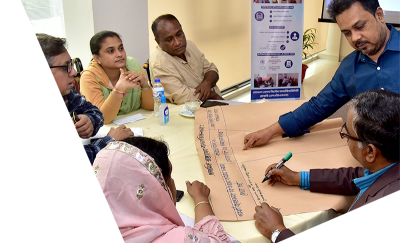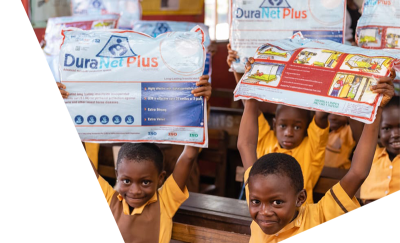PSHPA Trains Private Health Facilities to Submit RMNCH Data for DHIS2


For years, Benin’s private health sector was a bit of a black hole. While use of 752 private health facilities (PHFs) has increased in recent years, data about the services they delivered went largely unreported to the Ministry of Health (MOH). That created challenges. The absence of data hampered MOH assessments of comprehensive health data trends. And that created barriers to informed decisions and implementation of needed systemic changes.
Aggravating matters, the data collection tools didn’t accommodate some reproductive, maternal, neonatal, and child health (RMNCH) indicators. So, the information couldn’t show up on the dashboard for DHIS2, a software platform more than 75 countries use to collect, report, analyze, and disseminate data.
Then in 2018, the USAID-funded Private Sector Health Partnership Activity (PSHPA) stepped in. The project trained private providers on how to fill in National Health Management and Information System (NHMIS) tools, which feed data into DHIS2. PSHPA also conducted quarterly DHIS2 data quality control audits to help integrate and validate private sector data.
This collaborative effort involved close coordination with and training of health zone data managers, who report directly to the director for health statistics in the MOH Department of Programming and Foresight. These measures ensured a unified approach and regular reviews of the data that the private sector collected. When the MOH combined the data with public sector data, it had a comprehensive view of the healthcare landscape and could make more informed, evidence-based decisions.
Over the course of the project, which ended in 2023, PSHPA procured and distributed 4,000 health data registers to PHFs in all regions of Benin and helped increase the completeness of PHF data from 15% to over 100% of the target. PSHPA supported the NHMIS’s revision of RMNCH data collection and development of the DHIS2 RMNCH Dashboard. It also provided three servers to help ensure MOH intranet connectivity to facilitate data storage and the ability to conduct training without internet.
Since 2020, the Minonkpo Clinic in Avotrou has embraced these changes, recording consistent, complete, and timely data directly into DHIS2. All thanks to PSHPA. The project “is a valuable partner,” says Agbobli Rebecca, a state midwife at the Minonkpo Clinic in Cotonou. She notes that PSHPA not only improved data quality but also implemented emergency neonatal obstetric care protocols. The project’s impact thus is not just better data for decision-making. It also helps save newborns’ lives.
Read More

Pathways to UHC: Nigeria’s State and Local Approaches to Financing Integrated HIV Services and Primary Health Care
Nigeria’s state and local government-driven approaches to integrated primary health care are transforming financial protection and access for vulnerable populations, setting a replicable model for sustainable universal health coverage.

Building Climate Resilience Through Private Sector Partnerships
The Partnership for Climate Action, led by USAID CACCI, helps the private sector contribute to climate resilience through investment and innovation.

Health Systems Research (HSR) 2024
Abt Global is exhibiting and presenting at Health Systems Research (HSR) in Nagasaki, Japan in November 2024.

The 2024 Annual Meeting of the American Society of Tropical Medicine & Hygiene (ASTMH)
Abt Global is presenting and exhibiting at the 2024 Annual Meeting of the American Society of Tropical Medicine & Hygiene (ASTMH).